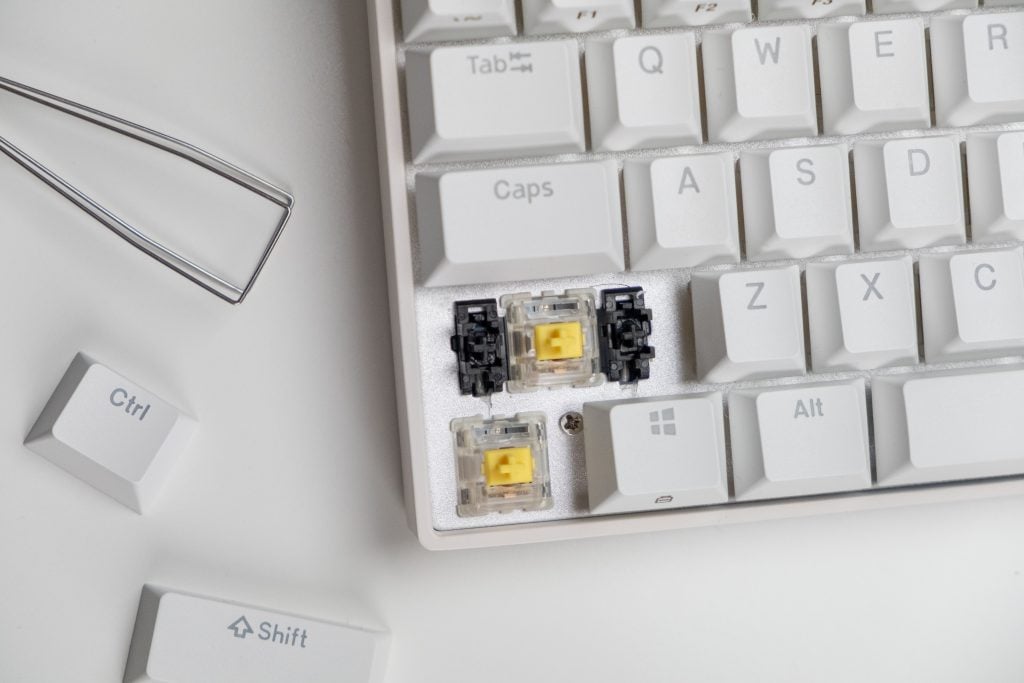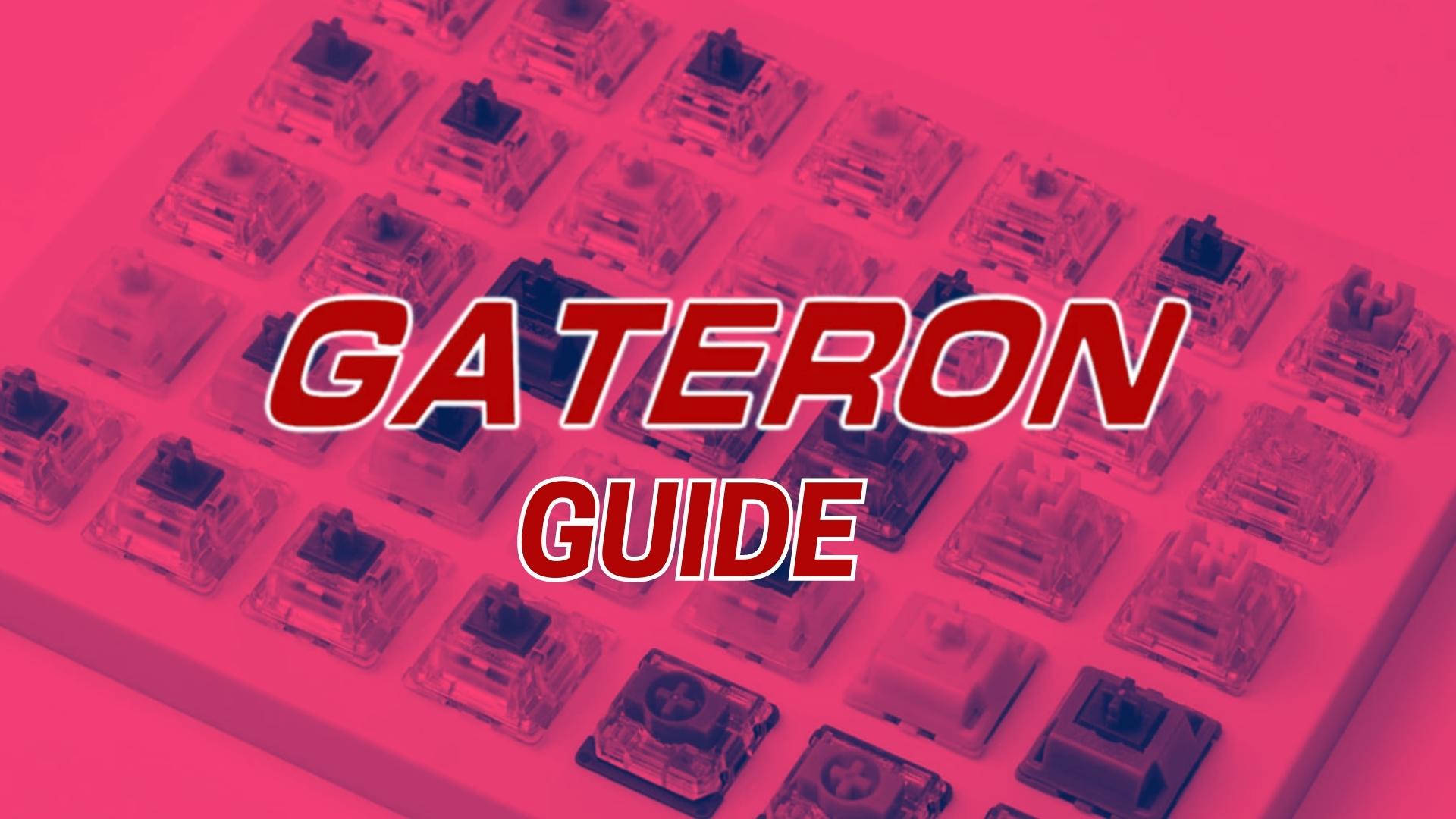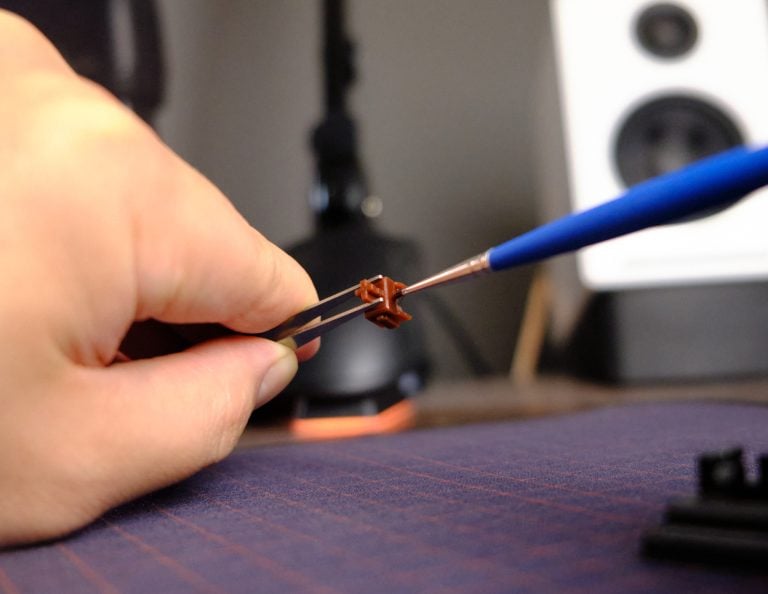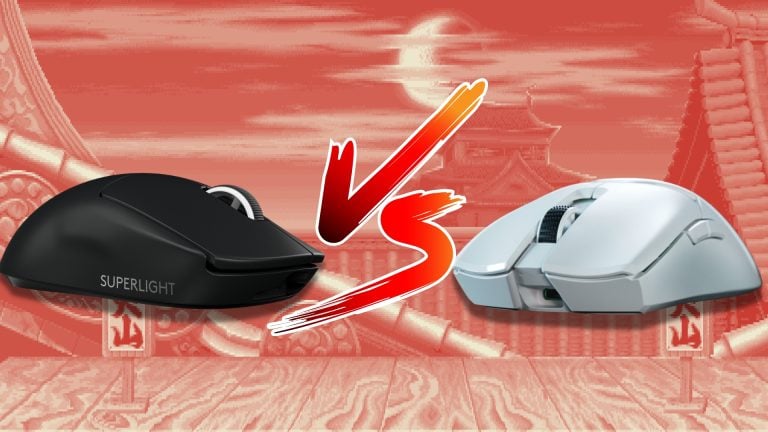If your wallet cannot afford Cherry MX switches, Gateron switches are cheaper and even feel better in your gaming keyboard
Gateron doesn’t skimp out on variety. With over seven different categories and various colors of switches, picking the one that’s best for you can be a real headache. I’ve had a good amount of experience with Gateron and have enjoyed plenty of them, here I am hammering away at some Gat Yellows:

Types of Gateron Switches
The switches use a naming scheme similar to Cherry MX as well, with names like Red, Blue, and Black vibing their way into the lineup. But Gateron goes a step further by having several exciting variations of their switches with different tweaks. The entirety of Gateron’s switches can be categorized as follows:
- Main Line Gateron Switches
- Silent Switches
- Low-Profile Switches
- Ink Switches
- Milk Switches
- Cap Switches
- Optical Switches
- New Switches
For an in-depth look at different switches by various companies, you can refer to our comprehensive Mechanical Switch Chart.
Main Line Color Switches

| Switch Name | Type | Travel Distance (± 0.6mm) | Actuation Force (± 15g) | Bottom Out | Noise Level |
| Red | Linear | 2mm | 45g | 4mm | Low |
| Black | Linear | 2mm | 60g | 4mm | Low |
| White | Linear | 2mm | 35g | 4mm | Low |
| Yellow | Linear | 2mm | 50g | 4mm | Low |
| Blue | Clicky | 2mm | 55g | 4mm | High |
| Green | Clicky | 2mm | 80g | 4mm | High |
| Brown | Tactile | 2mm | 45g | 4mm | Medium |
The regular switches by Gateron are comparable to their Cherry MX counterparts. The main line colors aren’t anything special in my opinion. They’re mostly a cheaper, less durable option compared to Cherry MX variants and I’ve found some of them to be quite scratchy, with a couple of exceptions. The Gateron Yellows are quite nice, providing a heavier linear that gets really smooth when you lube them. Gateron Blacks are also nice in the same way and far even heavier than the Yellows.
A note on G Pro, KS and other Main Color Switch Variations
There are now several versions of Gateron Reds, Yellows, Browns and Blues. Gateron now offers G Pro v2 and soon v3 switches that take the baseline Gateron switch, replacing parts with higher durability and factory lubing them.
The Gateron G Pro Yellows for example feel like lubed Gateron Yellows out of the box. All Pro versions retain the same actuation specs. The Pro switches are more expensive than base Gateron switches, so don’t expect to save a buck going for them. I personally think the Gateron Yellow Pros are some of the best switches Gateron makes.
Silent Switches
| Switch Name | Type | Travel Distance (± 0.6mm) | Actuation Force (± 15g) | Bottom Out | Noise Level |
| Silent Black | Linear | 2mm | 60g | 4mm | Low |
| Silent Red | Linear | 2mm | 45g | 4mm | Low |
| Silent Yellow | Linear | 2mm | 50g | 4mm | Low |
| Silent White | Linear | 2mm | 38g | 4mm | Low |
| Silent Brown | Tactile | 2mm | 55g | 4mm | low |
The silent lineup of Gateron Switches altogether forgoes Blue and Green Clicky switches, which is understandable. The remaining five switches have similar specs to their regular counterparts. But the stems of the silent switches come with a cushioned dampening pad on top and bottom to further reduce noise. I don’t particular like any of the silent line, too mushy.
Low-Profile Switches
| Switch Name | Type | Travel Distance (± 0.2mm) | Actuation Force (± 15g) | Bottom Out (± 0.2mm) | Noise Level |
| Low Profile Red | Linear | 1.7mm | 50g | 3mm | Low |
| Low Profile Brown | Tactile | 1.7mm | 55g | 3mm | Medium |
| Low Profile Blue | Clicky | 1.7mm | 65g | 3mm | High |
Low Profile Gateron’s have a much shorter actuation making them really nice for gaming and for slimmer laptop-style keyboards. These switches have been used quite a bit in Keychron’s low profile keyboards. I’d avoid the low profile blues, there are better clicky low profile switches like the Kailh that are better. The low profile and red and brown are solid and perform well.
Ink Switches
| Switch Name | Type | Travel Distance (± 0.6mm) | Actuation Force (± 15g) | Bottom Out | Noise Level |
| Ink Red | Linear | 2mm | 45g | 4mm | Low |
| Ink Black | Linear | 2mm | 60g | 4mm | Low |
| Ink Yellow | Linear | 1.2mm | 60g | 3.4mm | Low |
| Ink Blue | Clicky | 2.3mm | 75g | 4mm | High |
The Ink Switches are Gateron’s premium lineup, including four colors. They have an iconic smokey housing. The Ink line showed off what Gateron can do. For a while the Ink Blacks were the linear switch to use. Even now it’s a great linear.
Milk Switches
| Switch Name | Type | Travel Distance (± 0.6mm) | Actuation Force (± 15g) | Bottom Out | Noise Level |
| Milk Red | Linear | 2mm | 45g | 4mm | Low |
| Milk Black | Linear | 2mm | 60g | 4mm | Low |
| Milk White | Linear | 2mm | 35g | 4mm | Low |
| Milk Yellow Switch | Linear | 2mm | 50g | 4mm | Low |
| Milk Blue | Clicky | 2.3mm | 60g | 4mm | High |
| Milk Green | Clicky | 2.3mm | 80g | 4mm | High |
| Milk Brown | Tactile | 2mm | 55g | 4mm | Medium |
Milk Switches are no different than the regular switches, they have the same feel, though the Milky does not come lubed. The only difference is that the Milky top diffuses RGB lighting more. Get these if you want more of that blended RGB lighting effect instead of distinct LEDs.
Cap Switches
| Switch Name | Type | Travel Distance (± 0.6mm) | Actuation Force (± 15g) | Bottom Out | Noise Level |
| Milky Yellow | Linear | 2mm | 50g | 4mm | Low |
| Golden Yellow | Linear | 2mm | 50g | 4mm | Low |
| Milky Brown | Tactile | 2mm | 55g | 4mm | Medium |
| Golden Brown | Tactile | 2mm | 55g | 4mm | Medium |
| Cap Red | Linear | 2mm | 45g | 4mm | Low |
| Cap Blue | Clicky | 2.3mm | 60g | 4mm | High |
| Cap Brown | Tactile | 2mm | 55g | 4mm | Medium |
Cap switches again show off Gateron becoming more premium. Cap switches are made with tighter tolerances to reduce overall stem wobble and come pre-lubed from factory. If I were to rank Gateron Yellow variations, it would go Gateron Pros > Cap > Gateron Base.
Optical Switches
| Switch Name | Type | Travel Distance (± 0.6mm) | Actuation Force (± 15g) | Bottom Out | Noise Level |
| Optical Red | Linear | 2mm | 45g | 4mm | Low |
| Optical Black | Linear | 2mm | 60g | 4mm | Low |
| Optical White | Linear | 2mm | 35g | 4mm | Low |
| Optical Yellow | Linear | 1mm ±0.1mm | 35g | 4mm | Low |
| Optical Silver | Linear | 1mm ±0.1mm | 45g | 4mm | Low |
| Optical Blue | Clicky | 2mm | 60g | 4mm | High |
| Optical Brown | Tactile | 2mm | 55g | 4mm | Medium |
Coming in with a similar color lineup and stats are the Optical Gateron Switches. Instead of using a metal-to-metal connection for actuation, optical switches use infrared light. The lack of contact make the Optical switches quite smooth.
The responsiveness of these switches is unreal, making them one of the fastest switches ever produced by Gateron. Additionally, because there are fewer moving parts inside, the durability of these switches is increased, giving them a lifespan of up to 100 million keystrokes.
You’ll notice that there is no Optical Green switch, which is replaced by a Linear Optical Silver switch. The travel distance of the Optical Silver and Optical Yellow is halved, giving them a similar feel to Low-profile switches.
New Switches
These are the newer switches produced by Gateron in recent years. The naming scheme of these is unique, and so is their functionality.
| Switch Name | Type | Travel Distance | Actuation Force (± 15g) | Bottom Out | Noise Level |
| Oil King | Linear | 2mm ± 0.6mm | 55g ± 5g | 4 mm | Low |
| Kangaroo 59g/63g | Tactile | 1.5mm ± 0.5mm | 59g ± 15g | 3.5 mm | Medium |
| Kangaroo 59g/63g | Tactile | 1.5mm ± 0.5mm | 63g ± 15g | 3.5 mm | Medium |
| CJ | Linear | 2mm ± 0.6mm | 50g ± 15g | 4 mm | Low |
| North Pole – Yellow | Linear | 2mm ± 0.5mm | 55g ± 10g | 3.8 mm | Low |
| North Pole – Box Red | Linear | 2mm ± 0.5mm | 45g ± 10g | 4 mm | Low |
| North Pole – Box Silver | Linear | 1.2mm ± 0.2mm | 43g ± 10g | 3.4 mm | Low |
| Baby Kangaroo | Tactile | 2mm ± 0.5mm | 59g ± 8g | 3.4 mm | Medium |
| Baby Raccoon | Linear | 2mm ± 0.5mm | 55 ± 8g | 3.6 mm | Low |
Oil King Switch
55g actuation force | 2.0 mm actuation travel | 4.0 mm total travel
As the name suggests, Oil Switches come lubed or oiled from the factory. This gives them a much smoother feel and deeper sounds. These switches are an upgrade over the standard Gat Blacks for sure.
Kangaroo Switch 59g/63g
59g/63g actuation force | 1.5 mm actuation travel | 3.5 mm total travel
With an ink housing, the Kangaroo Switches come as a Tactile addition to Gateron’s Ink lineup. These can be bought in two actuation force variants, 59g or 63g. Kangaroo’s are a little bit scratchy but have a pretty good tactile bump, which hasn’t been Gateron’s strength so it’s good to see them improving here.
CJ Switch
50g actuation force | 2.0 mm actuation travel | 4.0 mm total travel
CJ, or “China-Joy” switches are a nod to the popular Chinese digital entertainment expo.
These are linear switches that produce a unique feel which is quite popular among fans.
North Pole Yellow/ Box Red/ Box Silver Switch
These have a completely transparent housing, which can help produce better backlighting.
Baby Kangaroo
59g actuation force | 2.0 mm actuation travel | 3.4 mm total travel
One of the newest switches by Gateron, the Baby Kangaroo Switch is a Tactile switch with an actuation force of 59g.
Unlike the standard Kangaroo Switches, these have transparent upper housing and a milky base.
Baby Raccoon
55g actuation force | 2.0 mm actuation travel | 3.6 mm total travel
Unlike the Kangaroo switches and the North Pole lineup, which shorten both the pre-travel and total travel distance, the Baby Raccoon has a reduced total travel distance only.
Thanks to a longer stem, this switch will bottom out earlier but retain the actuation point of 2mm, giving a unique feel that’s proved extremely popular among the masses.
Gateron vs Cherry — Which Is Better?
While both companies produce equally good and comparable switches, each has its strengths and weaknesses.
In short, if you want smoother switches with slightly reduced tactile feedback at a lower price, then Gateron is the one for you. But if you have extra money to spare and want your switches to last longer, then go with Cherry MX
Smoothness
Gateron’s switches are often smoother than their Cherry MX counterpart, giving you a buttery-smooth and consistent keystroke. But the degree of smoothness varies with different switches, with some being more or less smoother than others.
Feel
You’ll find that the switches of both companies have a very similar feel. For the Tactile and Clicky switches, however, there is a distinct difference in the amount of tactile feedback they provide, with Gateron’s switches being on the weaker side for their mainline switches. This, ultimately, falls down to preference. Outside of the mainline Gateron has some big winners on the tactile side. I’d pick Gaterons for feel.
Durability
Generally, Cherry MX switches are rated for 100 million keystrokes, while Gateron’s have a lifespan of only 50 million.
In terms of sheer durability, Cherry MX takes a clear win, which is why they’re widely accepted as the industry standard.
Price
The cost of increased durability is a higher price point, which users have to bear when they purchase Cherry MX switches.
Gateron’s switches might be less durable, but they’re considerably cheaper, making them popular among new users.
Which Gateron Switch is the Best for Gaming?
Linear Switches will give you the best results if you’re a gamer. The lack of feedback makes them highly responsive and sensitive to input. If you have the funds, I highly recommend going with the Gateron Ink switches when picking a category. The quality and feel of these are much better than other switches.
You can also go with the optical route if you prefer the durability and lightning-quick response from your keystrokes.
Gateron — A Company Overview

Gateron is a relatively newer contestant in the market of mechanical switches. Established under Huizhou Gateron Electronic Technology Co., Ltd in early 2000 in Southern China, Gateron started its venture by creating Cherry MX clones.
But don’t take Gateron’s Chinese origin as an indicator of their product’s quality. Since the company’s origin, they have heavily invested in research and development to create some of the most innovative switches in the market.
While Cherry still has a higher market share and might be considered the company behind mechanical switches, Gateron has been slowly gaining traction among keyboard users. This is thanks to the durability and smoother feel of Gateron’s switches while still being cheaper than Cherry MX.





